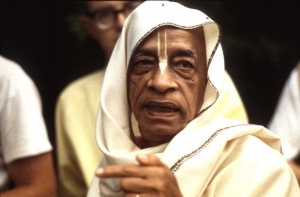CC Madhya 20.81 (1975)

A.C. Bhaktivedanta Swami Prabhupada
TEXT 81
- sanātana kahe,--"āmi mādhukarī kariba
- brāhmaṇera ghare kene ekatra bhikṣā laba?"
SYNONYMS
sanātana kahe—Sanātana replied; āmi—I; mādhukarī kariba—shall practice acceptance of food by mādhukarī means; brāhmaṇera ghare—in the house of a brāhmaṇa; kene—why; ekatra—in one place; bhikṣā laba—I should accept lunch.
TRANSLATION
Sanātana replied,"I shall practice the process of mādhukarī. Why should I accept full meals in the house of a brāhmaṇa?"
PURPORT
The word mādhukarī comes from the word madhukara, which refers to bees collecting honey from flower to flower. A mādhukarī is a saintly person or a mendicant who does not accept a full meal at one house but begs from door to door, taking a little food from each householder's place. In this way he does not overeat or give householders unnecessary trouble. A person in the renounced order may beg but not cook. His begging should not be a burden for the householders. The mādhukarī process is strictly to be followed by a bābājī, that is, one who has attained the paramahaṁsa stage. This practice is still current in Vṛndāvana, and there are many places where alms are offered. Unfortunately, there are many beggars who have come to Vṛndāvana to accept alms but not follow the principles of Sanātana Gosvāmī. People try to imitate him and lead an idle life by practicing mādhukarī. It is almost impossible to strictly follow Sanātana Gosvāmī or Rūpa Gosvāmī. It is better to accept food offered to Kṛṣṇa in the temple than to try to imitate Sanātana Gosvāmī and Rūpa Gosvāmī.
yuktāhāra-vihārasya
- yukta-ceṣṭasya karmasu
yukta-svapnāvabodhasya
- yogo bhavati duḥkha-hā
"He who is temperate in his habits of eating, sleeping, working and recreation can mitigate all material pains by practicing the yoga system." (Bg. 6.17)
The ideal sannyāsī strictly follows the ways practiced by the Gosvāmīs.